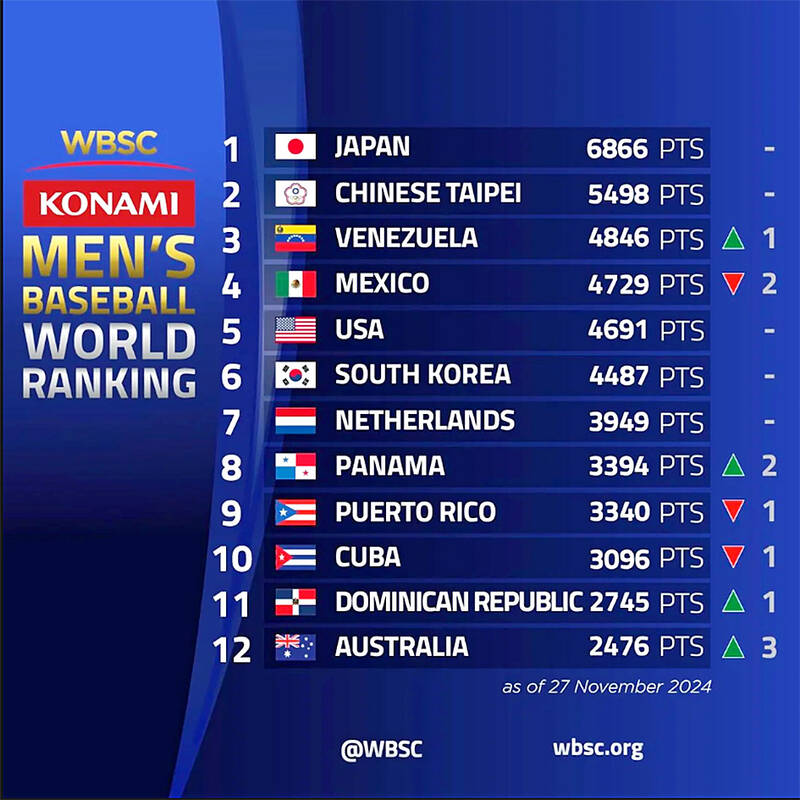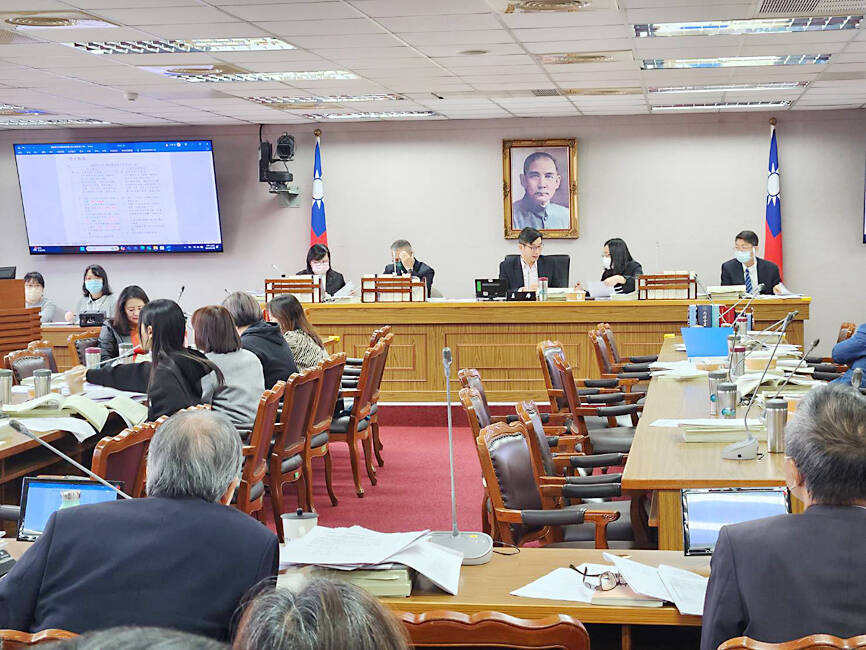Taiwan moved clear of Mexico to be the only country at No. 2 in the World Baseball Softball Confederation (WBSC) Men’s Baseball World Rankings.
Meanwhile, draft bills to set up a ministry of sports were approved at a joint session at the legislature in Taipei yesterday.
After previously being tied with Mexico for second on 4,118 points, Taiwan moved clear on 5,498 points after they defeated Japan in the final of the WBSC Premier12 tournament on Sunday.

Mexico (4,729) dropped to fourth, behind Venezuela (4,846), who finished fourth at the tournament.
Taiwan narrowed the gap to first-placed Japan to 1,368 points from 1,638, WBSC data showed.
Meanwhile, draft organic laws for a ministry of sports and a sports-for-all administration were approved by legislative committees.

Photo: Hsieh Chun-lin, Taipei Times
The Cabinet on Oct. 17 approved the bills and they made it through a joint session of the Judiciary and Organic Laws and Statutes Committee and the Education and Culture Committee yesterday, earning support from all parties without any provisions for further review.
The ministry would be established by the Executive Yuan to build a “sports for all” environment and develop a sporting culture in terms of education, athletics, industry and diplomacy, with a focus on diversity, equity, inclusion and sustainability, the bills say.
The ministry would have a minister, two deputy ministers and a vice minister, they say.
Chinese Nationalist Party (KMT) Legislator Hung Meng-kai (洪孟楷) proposed building a museum to preserve sporting culture and history.
KMT Legislator Ko Chih-en (柯志恩) in an incidental resolution said that the agency responsible for managing fulltime coaches should be affiliated with the ministry.
Taiwan People’s Party (TPP) caucus whip Huang Kuo-chang (黃國昌) and other TPP lawmakers in a motion to amend the bills mentioned the planning, promotion and management of adapted physical education, para-athletics and inclusive sports, as well as the hosting of international sports events and the arrangements for local athletes to take part in global sports organizations.
Democratic Progressive Party (DPP) Legislator Lin I-chin (林宜瑾) and other DPP lawmakers in a separate motion added a goal to “ensure good work conditions for the sports industry to enhance the labor-management relationship.”
The lawmakers reached a consensus on the planned ministry’s roles and responsibilities, including the planning, promotion and management of national policies and regulations; development of talent and industries; consultation services for professional sports; preservation and promotion of sporting culture and history; management of sports betting and a sports development fund; and promotion and supervision of sports science development.
DPP Legislator Chung Chia-pin (鍾佳濱), who hosted the meeting, said that the bills would be handed over for cross-party negotiations, during which lawmakers could voice more opinions.
An impromptu motion by DPP caucus chief executive Rosalia Wu (吳思瑤) to establish Nov. 24 as a national baseball day was also approved.

In his National Day Rally speech on Sunday, Singaporean Prime Minister Lawrence Wong (黃循財) quoted the Taiwanese song One Small Umbrella (一支小雨傘) to describe his nation’s situation. Wong’s use of such a song shows Singapore’s familiarity with Taiwan’s culture and is a perfect reflection of exchanges between the two nations, Representative to Singapore Tung Chen-yuan (童振源) said yesterday in a post on Facebook. Wong quoted the song, saying: “As the rain gets heavier, I will take care of you, and you,” in Mandarin, using it as a metaphor for Singaporeans coming together to face challenges. Other Singaporean politicians have also used Taiwanese songs

NORTHERN STRIKE: Taiwanese military personnel have been training ‘in strategic and tactical battle operations’ in Michigan, a former US diplomat said More than 500 Taiwanese troops participated in this year’s Northern Strike military exercise held at Lake Michigan by the US, a Pentagon-run news outlet reported yesterday. The Michigan National Guard-sponsored drill involved 7,500 military personnel from 36 nations and territories around the world, the Stars and Stripes said. This year’s edition of Northern Strike, which concluded on Sunday, simulated a war in the Indo-Pacific region in a departure from its traditional European focus, it said. The change indicated a greater shift in the US armed forces’ attention to a potential conflict in Asia, it added. Citing a briefing by a Michigan National Guard senior

CHIPMAKING INVESTMENT: J.W. Kuo told legislators that Department of Investment Review approval would be needed were Washington to seek a TSMC board seat Minister of Economic Affairs J.W. Kuo (郭智輝) yesterday said he received information about a possible US government investment in Taiwan Semiconductor Manufacturing Co (TSMC, 台積電) and an assessment of the possible effect on the firm requires further discussion. If the US were to invest in TSMC, the plan would need to be reviewed by the Department of Investment Review, Kuo told reporters ahead of a hearing of the legislature’s Economics Committee. Kuo’s remarks came after US Secretary of Commerce Howard Lutnick on Tuesday said that the US government is looking into the federal government taking equity stakes in computer chip manufacturers that

CLAMPING DOWN: At the preliminary stage on Jan. 1 next year, only core personnel of the military, the civil service and public schools would be subject to inspections Regular checks are to be conducted from next year to clamp down on military personnel, civil servants and public-school teachers with Chinese citizenship or Chinese household registration, the Mainland Affairs Council (MAC) said yesterday. Article 9-1 of the Act Governing Relations Between the People of the Taiwan Area and the Mainland Area (臺灣地區與大陸地區人民關係條例) stipulates that Taiwanese who obtain Chinese household registration or a Chinese passport would be deprived of their Taiwanese citizenship and lose their right to work in the military, public service or public schools, it said. To identify and prevent the illegal employment of holders of Chinese ID cards or